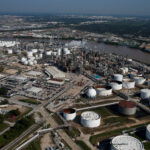Total: “positioned to be the most profitable European major oil company”
French oil major Total (ticker: TOT) reported its third quarter earnings today. The company has continued to send the same message every quarter, focusing on increasing production and declining operational costs and capital spending.
“We expect the environment to remain volatile but based on our 2015 and first half 2016 performance, Total has been the best performing major whether the oil price is rising or falling. Our priority is to continue reducing break-evens and improving cash flow,” said Total CFO Patrick de la Chevardière. This quarter, the company is on track to surpass its goal of reducing operating costs by $2.4 billion, the company said.
Upstream production has grown more than 4.3% this year to 2.44 MMboe/d due to new start-ups and ramp ups, although third quarter adjusted net income fell 25 percent to $2.07 billion.
Strong performance in its LNG business has helped Total outperform its peers, Chevardière said on the conference call. “LNG volumes have grown 5% year-over-year for the nine months and represent more than 30% of upstream net results. This is part of the reason we have outperformed our peers.”
Key Third Quarter Events
- Production was restarted at the giant Kashagan field in Kazakhstan on the Caspian Sea, of which Total’s share of production is 16.8%. It is expected to reach its 370,000 bl/d target by year end 2017. The project made its first shipment of crude from its onshore processing plant earlier this month and has been plagued by billions of dollars cost overruns and delays.
- In September, the company exercised preemption rights to acquire Chesapeake’s Barnett shale gas assets with capacity of 65,000 boe/d in 2016.
- The company recently signed a memorandum of understanding (MOU) with Brazilian state-owned company Petrobras to cooperate on upstream and downstream projects, with the first phase of implementation focusing on gas and power.
- This morning, the company also announced an oil discovery in the Black Sea, 80 miles off the Bulgarian coast. Total is an operator on the block with 40% interest, with Austria’s OMV and Spain’s Repsol each taking 30% stakes.
Analyst Q&A
In the Q&A session, the company elaborated on its LNG projects, expected CapEx for its recently acquired Barnett assets from Chesapeake, international agreements with other companies, and updates on country risk.
Q: Can you elaborate on the project delivery in 2017, particularly Ichthys? How that’s going in terms of delivery in 2017 rather than 2018?
TOT: The overall progress on Ichthys, where we own 30%, is about 90% at the moment. According to the operator, the startup is scheduled in the second half of 2017. Construction of the CPF and the FPSO is complete, and commissioning work ongoing, ready for sail away by end of 2016, and then sail away to the field at appropriate timing. Exact timing is yet to be confirmed by the operator, but according to this operator, we’re going to keep startup date unchanged. All modules for the LNG plant have been delivered to Darwin and commissioning is in progress. And the pipeline, I remind you, was completed in 2015. That was for Ichthys.
Q: You are developing a number of LNG projects, you know, Yamal, Ichthys, GLNG is ramping up, and obviously you have some greenfield optionalities, Elk-Antelope, or Papua LNG, you call it now. But in your view, what is the critical mass needed really to hit the sweet spot of value and risk in LNG and do you think you have a gap there right now?
TOT: On LNG, I’d like to remind you that LNG is representing 15%, one-five, of our production, is making 30% of the upstream net income. So it is a good business whatever you can earn as well. When we sign and launched an LNG project, we have contracted all the volumes produced or 95% of the volume produced by this project. This is the case for Ichthys, for GLNG, for Yamal when it will start. All the volumes are contracted. And I think we already have the critical mass. We are number two in the world. What matters is the portfolio size in trading and downstream and I think we have both. So we are profitable now and I would say very profitable because our scenario is different than other companies. We contracted long-term, we don’t play spot markets. We are profitable now and we will remain at the same level, being profitable.
Q: Some of the big Asian importing countries have been a bit soft in terms of their imports. Is Total still placing your volumes into those legacy countries? Or are you having to place them elsewhere despite some long-term contracts?
TOT: Yes, we had good volumes and good results. Usually we were selling long-term volumes to Japan, Korea, and Taiwan. We enlarged our marketing activities to mainland China and Indonesia. I think this is part of our business, to provide LNG to both new countries willing to buy LNG and I think we are flexible enough and we have a large portfolio which enables us to sell long-term or medium-term volume to so-called new countries in the market, like for instance Indonesia. And I remind you, we started to sell to mainland China also, obviously, which is a great importer at the moment.
Q: What are your thoughts on your strategic alliance with Petrobras and how you expect that to play out over the coming years? In terms of what you’re looking for in terms of new JVs or assets, are you looking for early stage appraisal activity or expiration or would you be interested in volume also?
TOT: Honestly, we at Total are very happy to enter into such an agreement with Petrobras. We do recognize Petrobras as being a good operator. They have great assets and we like to work with them. We have just signed this MOU for this strategic alliance. Obviously it opens new opportunities for us in Brazil. It joins them through participation in Libra where things are going well. We are in a call for tender process for the surface PSO awards. Remember too, if you consider the early production scheme being one FPSO. And we look for a while to build our relation with Petrobras on that.
We will pursue opportunities with Petrobras. We are discussing with them at the moment. The alliance is perfectly fitting our strategic targets. We are building our portfolio on technological strength that we can bring to Petrobras. And we are, as I repeat, very happy to expand our exposure to Brazil because not only due to the quality, the high quality, of the asset that you can encounter in this country, but also to the fact that we are glad to work with Petrobras, with a good operator and a good company. And they are, Petrobras, getting out of the mess that we’re facing in the past, and I’m glad to see that Petrobras is back to work with a major oil company like us.
Q: Can you talk about what level of CapEx is required to keep production flat at the Barnett Shale acquisition?
TOT: Yes, we took this opportunity to preempt 75% from Barnett. As I recall you, we own 25% before, which enabled us to preempt the deal. It has been – this transaction has been negotiated by a fair preserve affiliate for more than a year. The terms and conditions were extremely attractive. We believe that this deal is excellent and it’s rare for me to use this word. Acquisition is about $500 million. Midstream contract will be restructured. The Barnett is cash positive now at less than $2 per million BTU and [indiscernible] through this new set of contact.
We will establish a new operating company, basically hiring people coming from Chesapeake, and some manager that we will hire from the U.S. market. There will be no expats in this business. We are basically hiring from Chesapeake about 150 people to operate this transaction, and this deal is opportunistic, and we recognize it, and this new operating company dedicated to Barnett will be fully dedicated to this asset.
For CapEx, I honestly don’t know. I have an idea that it will be very limited. Basically that was related to well interventions, and somewhat covered to maintain the production I think. So, it is a limited number but I don’t have the exact figure for you.
Q: Can give us an update on what Total is seeing in Libya?
TOT: On Libya offshore, we are operating offshore, Al Jurf. As usual, normal operation. Offshore we have had some damages on our assets, so basically – and we have no people on the ground, I would say, at the moment. So, it’s too early for me to say anything on that matter. The production overall in Libya is reported to have increased to about a little bit less at about 600,000 barrel per day, I think. The National Oil Company has announced 900,000 barrel per day target. This would include the restart of El Sharara field in the south desert, in which Total has a stake. El Sharara would be present about 30,000 barrel per day net at plateau. But, I have no more to say. I mean, the current situation is difficult to assess. It’s a civil war situation. We noted this positive statement by the National Oil Company and we will follow closely what they are doing to recover operation on both fields.
Total’s 3Q 2016 earnings release, and conference call webcast are provided below.







